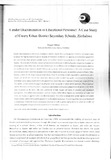Please use this identifier to cite or link to this item:
https://cris.library.msu.ac.zw//handle/11408/429| Title: | Gender discrimination in educational personnel: a case study of Gweru urban district secondary schools, Zimbabwe | Authors: | Matope, Nogget | Keywords: | gcndci discrimination, gender equity, female educational personnel | Issue Date: | 2012 | Publisher: | David Publishing | Abstract: | Gender discrimination in educational institutions persists, despite the vigorous pursuit of policies and programmes to reduce the varying degrees of gender inequity in Zimbabwe. Zimbabwe is a signatory to international agreement and conventions which promote gender equity with a throw towards increased access to education for girls and female. The creation of a healthy educational and social environment in which all people irrespective of gender are encouraged to fully utilize their skills and talents would be an effective tool to eliminate discriminatory practices and tendencies in the education system. Using a survey design and document analysis, this study investigated the practices perceived to constitute discrimination among educational personnel in secondary schools in Gweru Urban District. A total of 120 educational personnel drawn from 12 secondary schools responded to questionnaire and a sample out of 20 with face-to-face interviews. Analyzed data revealed that gender discrimination in learning institutions exists and p manifested in the appointments, promotion and assignment of duties and responsibilities. As a result, women seem to be negatively affected, in the low uptake of administrative positions. The government and the Ministries of Education need to implement professional development programmes on gender issues which raise awareness on the status, role, and contribution of both females and males in education and educational management. This effort would promote a cultural climate, within which females see themselves as leaders and males see women as capable leaders and decision-makers. This effort would promote gender equality and gender empowerment, and minimize gender prejudices in educational institutions It is envisaged that this would help build a critical mass of females in decision-making processes as well as gender equity initiatives which are visible and vibrant with gender disaggregated data available in all educational institutions | URI: | http://hdl.handle.net/11408/429 | ISSN: | 1548-6613 |
| Appears in Collections: | Research Papers |
Files in This Item:
| File | Description | Size | Format | |
|---|---|---|---|---|
| MATOPE N 001.pdf | 263.69 kB | Adobe PDF |  View/Open |
Page view(s)
30
checked on Jul 24, 2024
Download(s)
4
checked on Jul 24, 2024
Google ScholarTM
Check
Items in MSUIR are protected by copyright, with all rights reserved, unless otherwise indicated.



